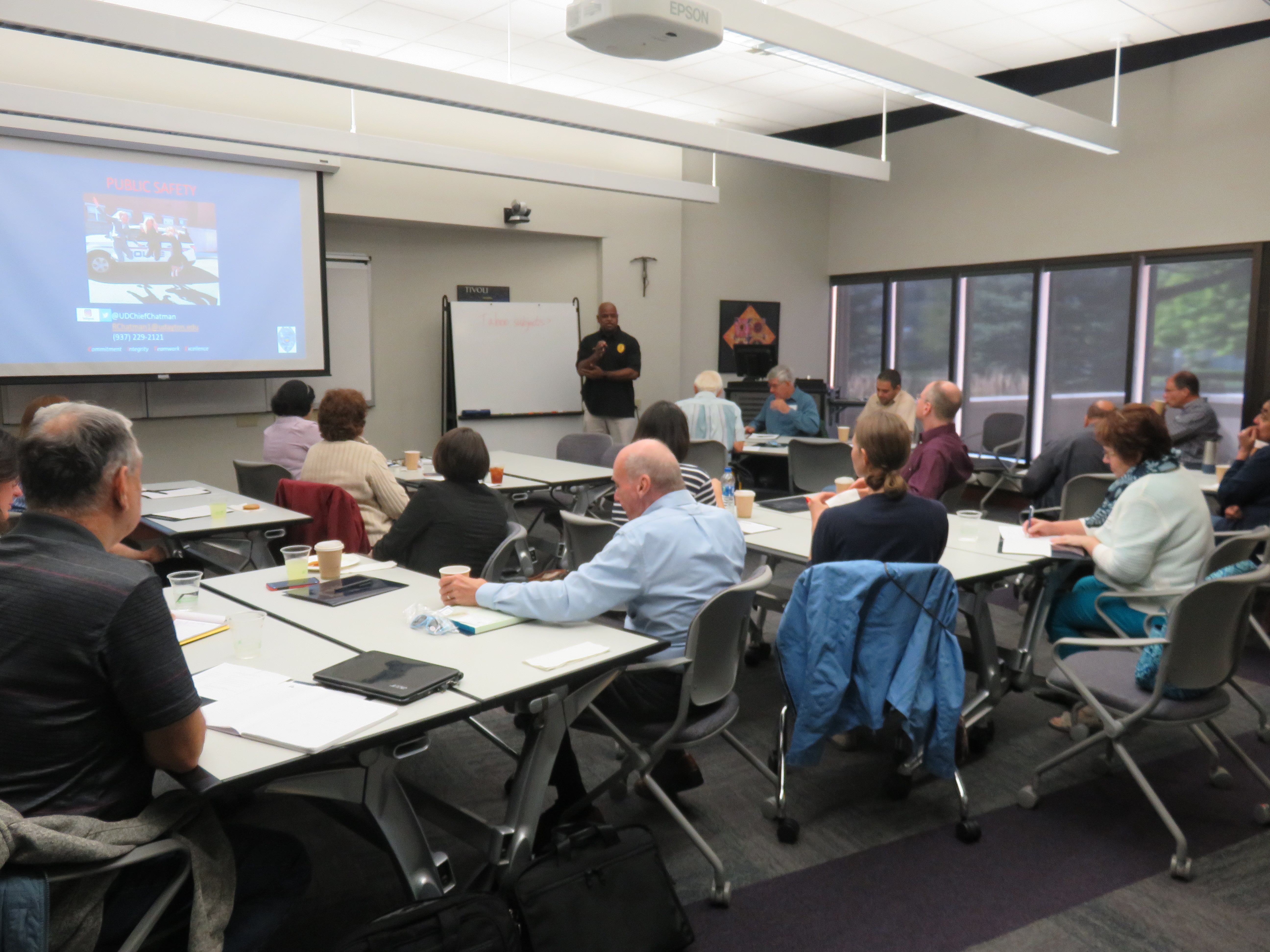LTC

Exploring Our Institutional Learning Goals
Efforts are underway to help our campus community explore more deeply our Institutional Learning Goals (ILGs), which reflect what it means to be educated in the Catholic and Marianist traditions at the University of Dayton. Thanks to the work of a number of groups, conversations are occurring and resources are being developed to help faculty and staff think about how to more intentionally integrate and incorporate these ILGs in our work with students. Recall that the Habits of Inquiry and Reflection (HIR) document from 2006 articulates the seven Institutional Learning Goals for our students:
- Scholarship
- Faith traditions
- Diversity
- Community
- Practical wisdom
- Critical evaluation of our times
- Vocation.
- Two groups, one focused on Vocation and one focused on Practical Wisdom, developed working papers to enhance our understanding of these ILGs and take stock of what is already being done on campus to help our students pursue these ILGs. These working papers can be found on the Provost’s web site (https://www.udayton.edu/provost/about/resources.php).
Beginning last academic year, a third working group was convened around the ILG of Community. That team, led by Steve Herndon (Student Development) and Kelly Johnson (Religious Studies), is completing their working paper, which will be available on the Provost’s web site later this semester.
All of the efforts to explore three of our ILGs more deeply have led to the creation of teams designed to help faculty, staff, and students with pursuit of these goals. The Vocation team is led by Steve Wilhoit (English/LTC) and Crystal Sullivan (Campus Ministry) and a Practical Wisdom team is being chaired by Steve Bein (Philosophy).
Be on the lookout for opportunities to engage with these groups in their work in the coming semesters and, if you are interested in convening a group around one of the ILGs that remain to be explored, please reach out to Michelle Pautz, Assistant Provost for the Common Academic Program (CAP), at mpautz1@udayton.edu.
The Provost’s Office appreciates the contributions of the following individuals, past and present, to these efforts.
Vocation
Mike Bennett, Campus Ministry/Retreats and Faith Communities
Maria Ollier Burkett, Honors Program
Kim Conde, UDit
Madeleine DeBeer, Chemistry/Premedical Programs
Irene Dickey, Management and Marketing
Jason Eckert, Career Services
Cheryl Edelmann, MIS, OM & Decision Sciences
Susan Ferguson, Center for Catholic Education
Re’Shanda Grace-Bridges, Student Development/New Student Programs
Kevin Hallinan, Mechanical and Aerospace Engineering
Andrew Henrick, Mechanical and Aerospace Engineering
Julie Huckaba, Flyer Student Services/Financial Aid
Katie Kinnucan-Welsch, Teacher Education
Suki Kwon, Art and Design
Allison Leigh, Office for Mission and Rector
Marissa McCray, Core Program
Elizabeth Montgomery, Campus Ministry/Retreats and Faith Communities
Steven Neiheisel, Political Science
Judy Owen, Learning Teaching Center/Common Academic Program
Molly Schaller, formerly in Counselor Education and Human Services
Christina Smith, Student Development/Housing and Residence Life
Crystal Sullivan, Campus Ministry
Karen Velasquez, Learning Teaching Center/Experiential Learning
Cari Wallace, Student Development
Michael (Sievers) Wheeler, Career Services
Steve Wilhoit, English and Learning Teaching Center/Faculty Career Enhancement
Amy Vukcevic Williams, Advancement/Alumni Relations
Sr. Angela Ann Zukowski, Religious Studies and Institute for Pastoral Initiatives
Practical Wisdom
Steve Bein, Philosophy
Jana Bennett, Religious Studies
Kelly Bohrer, School of Engineering/Community Relations
Susan Brown, Learning Teaching Center/Faculty Development and Communication
Riley Dugan, Management and Marketing
Br. Ray Fitz, S.M., Fitz Center/Fr. Ferree Professor of Social Justice
Sandy Furterer, Engineering Management, Systems, and Technology
Martha Hurley, Criminal Justice Studies
Justin Keen, Learning Teaching Center/Assessment and Student Centered Analytics
Samantha Kennedy, Campus Ministry/Center for Social Concern
Drew Murray, Mechanical and Aerospace Engineering
Danielle Page, Student Development/Housing and Residence Life
Haozhou Pu, Health and Sport Science
Lisa Rismiller, Office of the President
Mary Kate Sableski, Teacher Education
Christine Schramm, Student Development
Yvonne Sun, Biology
Karen Velasquez, Learning Teaching Center/Experiential Learning
Versalle Washington, Dean’s Office, College of Arts and Sciences and History
Tom Whitney, Civil and Environmental Engineering and Engineering Mechanics
David Wright, Biology, Learning Teaching Center/Academic Technology and Curriculum Innovation, and UDit
Community
Kim Bigelow, Mechanical and Aerospace Engineering
Una Cadegan, History
Diana Cuy Castellanos, Health and Sport Science
Alan Demmitt, Counselor Education and Human Services
Christopher Fishpaw, Student Development/Center for Student Involvement
Hunter Phillips Goodman, Fitz Center for Leadership in Community
Daria Graham, Student Development/Office of Multicultural Affairs
Sangita Gosalia, Center for International Programs/Campus Engagement
Steve Herndon, Student Development/Housing and Residence Life
Kelly Johnson, Religious Studies
Joseph Krella, School of Business Administration
Chad Painter, Communication
Chelse Prather, Biology
Kathy Sales, Campus Ministry
Kellie Schneider, Engineering Management, Systems, and Technology
Castel Sweet, Fitz Center for Leadership in Community
Bill Trollinger, History, Religious Studies, and Core Program
Erick Vasquez, Chemical and Materials Engineering
Chanel Wright, Center for International Programs/Campus Engagement
Mary Ziskin, Educational Administration
